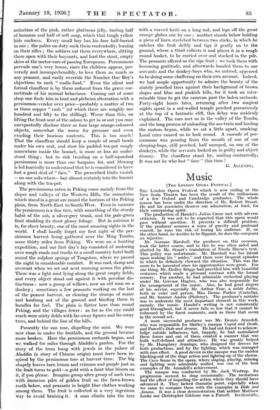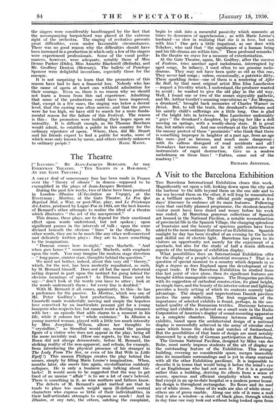Music
THE LONDON OPERA FES'TIVAL.] THE London Opera Festival which is now ending at the New Scala Theatre has been the result of the enthusiasm of a few Oxford and Cambridge graduates. The whole season has been under the direction of Mr. Robert Stuart. He and his associates deserve our admiration, at least, for their enterprising spirit. The production of Handel's Julius Ccesar met with adverse criticism. It was not to be expected that this opera would pass without question. It presents a difficult problem. If the producer assumes a mien of gravity and profound conceit, he runs the risk of boring his audience. If, on the other hand, he decides to be flippant, he does the composer an injustice.
Mr. Norman Marshall, the producer on this occasion, took the latter course, and in this he was often aided and abetted by Mr. Stuart's translation of Nicola Haym's text. This policy was unfortunate. Mr. Marshall was too intent upon making his " asides," and there were frequent episodes in which he definitely clowned the situation. This was the more to be lamented since his opportunities were great. For one thing, Mr. Hedley Briggs had provided him with beautiful costumes which made a pleasant contrast with the formal scenery. For another, he had admirable orchestral playing under Mr. Gervase Hughes, who was also responsible for the arrangement of the music. Also, he had good singers at his service, especially Mr. Arthur Fear, a noble Julius, both in voice and person, Miss Denne Parker (Cornelia), and Mr. Sumner Austin (Ptolemy). The producer's mistake was to underrate the most important element in this work, namely, the music. Handel's writing is not consistently good throughout, but it never falls so low that it cannot be redeemed by the finest moments, such as those that occur in the second act.
A more successful producer was Mr. Dennis Arundel', who was responsible for Shirley's masqup Cupid and Death, and Purcell's Dido and Aeneas. He had not feared to acknow- ledge outside influences, but, happily, he had assimilated these forces and out of them created a manner that was both well-defined and attractive. He was greatly helped by Mr. Humphrey Jennings, who designed the dresses for both productions, and by the lighting, which was managed with sure effect. A good device in the masque was the sudden blacking-out of the stage action and lighting-up of the chorus. The Cave Scene in the opera, where singing, playing, miming and lighting were admirably unified, was one of the best examples of Mr. Arundell's achievement. The masque was conducted by Mr. Jack Westrup. Its progression seemed to drag occasionally. The recitatives had the effect of impeding the action where they should have advanced it. They lacked dramatic point, especially when we came to compare them with the examples in Dido and Aeneas. It was a clear demonstration that neither Matthew Locke nor Christopher Gibbons was a Purcell. Incidentally,
the singers were considerably handicapped by the fact that the accompanying harpsichord was placed at the extreme right of the orchestra. The singing of recitative presents great difficulties, even under favourable circumstances. There was no good reason why the difficulties should have
i been increased in a production in which only a few of the singers were experienced professionals. Some of the vocal perfor- mances, however, were adequate, notably those of Miss Denne Parker (Dido), Miss Annette Blackwell (Belinda), and Mr. Geoffrey Denton (Mercury). The ballets of Penelope Spencer were delightful inventions, especially those for the masque.
It is not surprising to learn that the promoters of this season have had to face a financial loss. Nobody who has the cause of opera at heart can withhold admiration for their courage. Even so, there is no reason why we should not learn a lesson from this sad experience. Admitting that some of the productions could have been improved, that, except in a few cases, the singing was below a decent level, that the casting was often unwise, and that the prices were far too high, we have still to search for a more funda- mental reason for the failure of this Festival. The reason is this : the promoters were building their hopes upon an unreality. It is difficult enough, as Sir Thomas Beecham would admit, to establish a public in this country for the ordinary repertoire of opera. Where, then, did Mr. Stuart and his friends expect to find a public for works, some of which were only known by name, and others entirely unknown







































 Previous page
Previous page